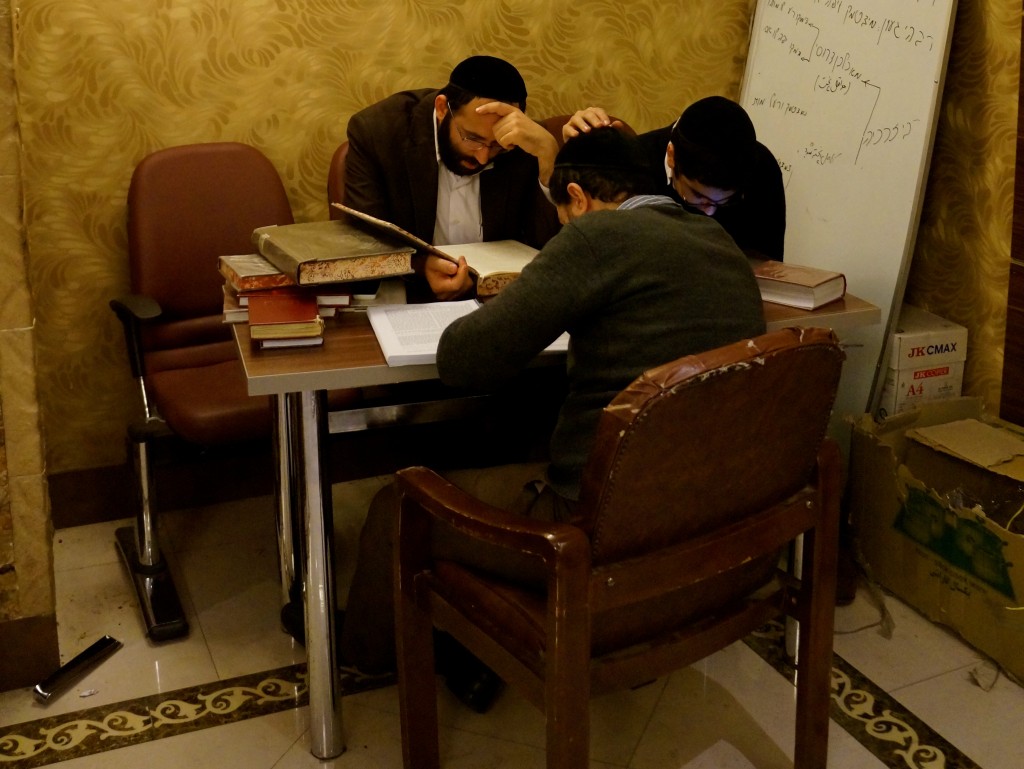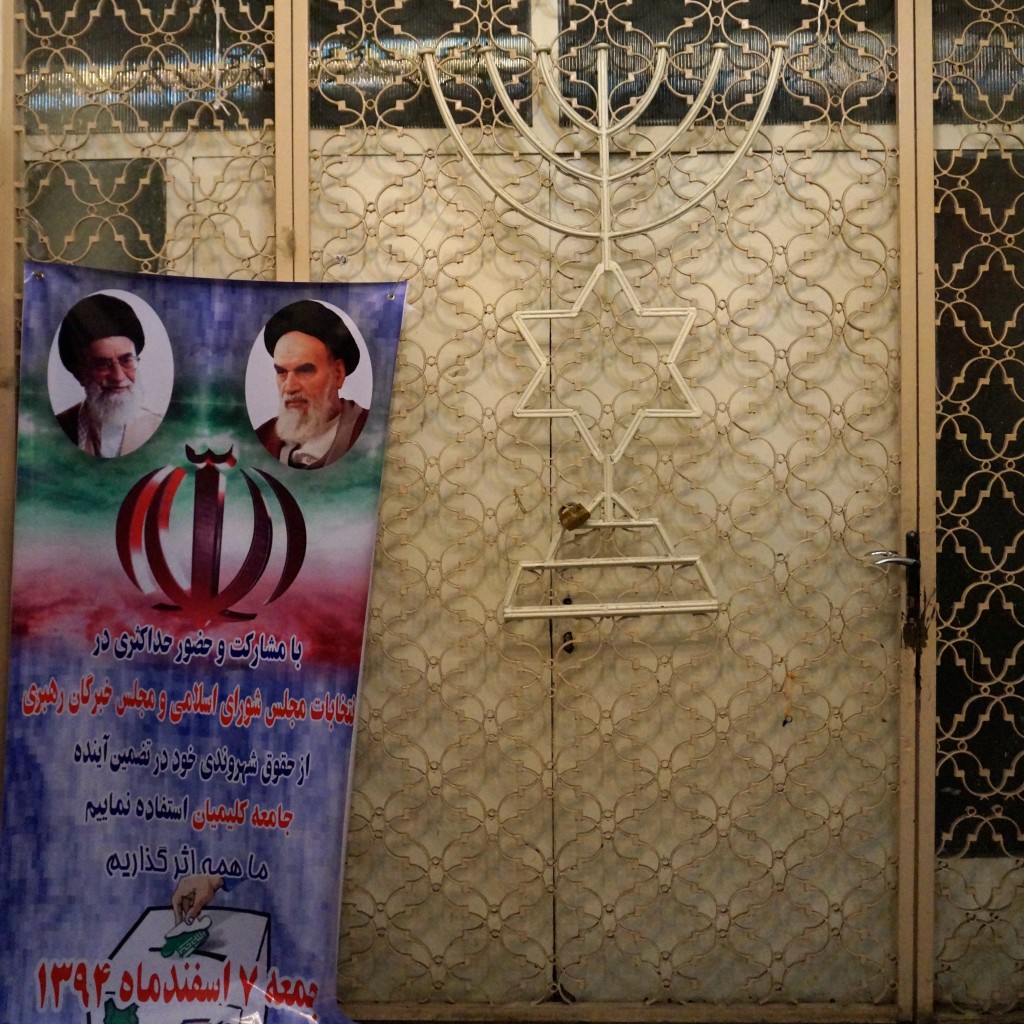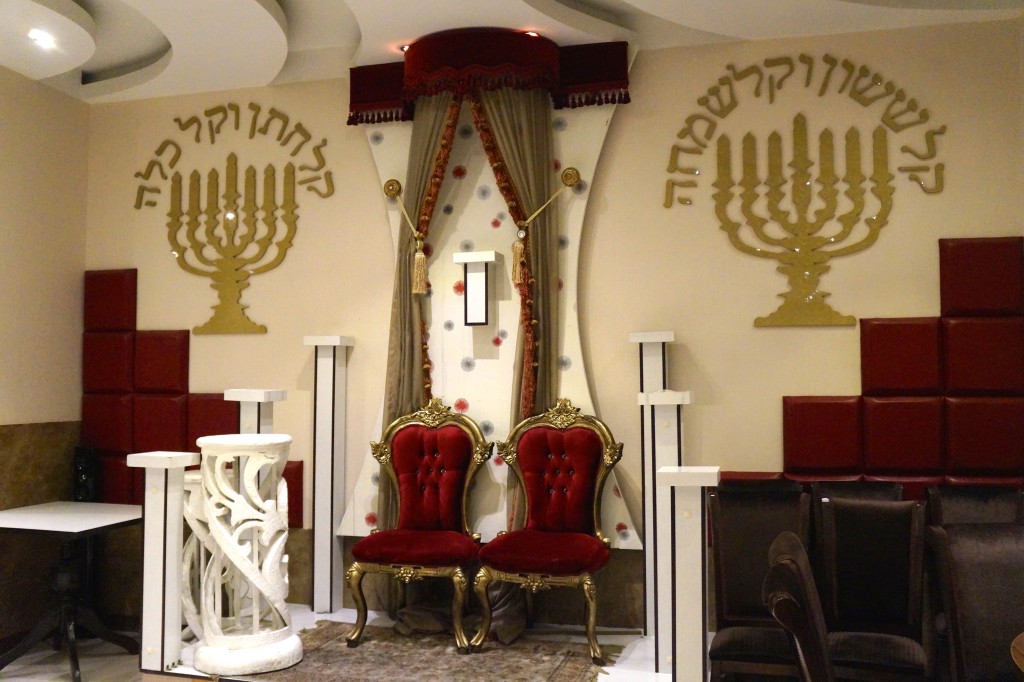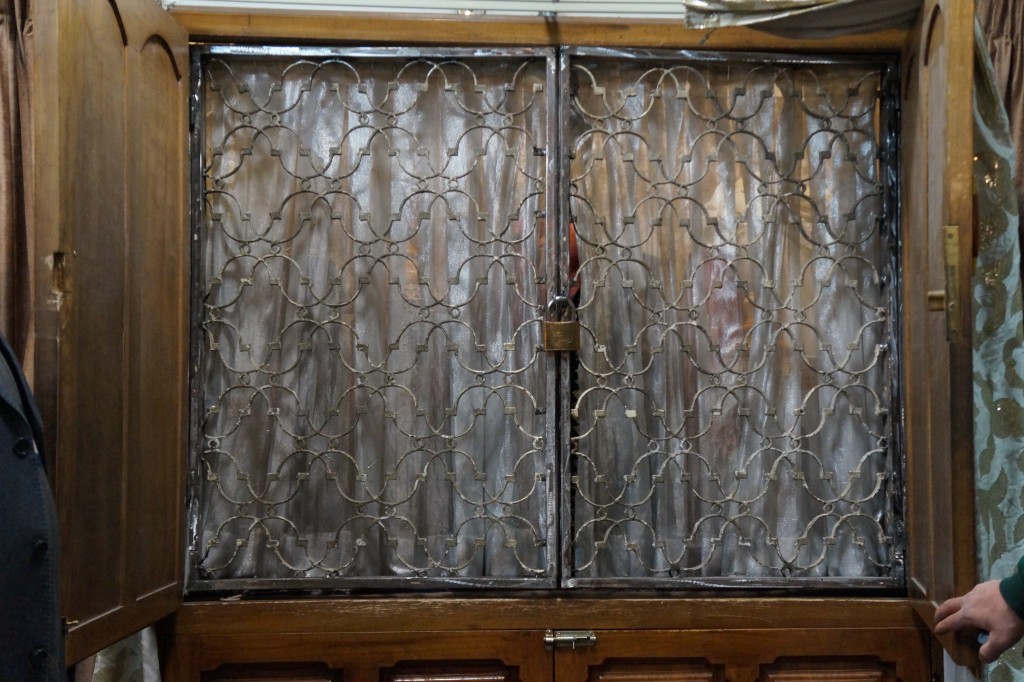What is it like to live as a Jew in a country that preaches the destruction of the Jewish state?
It’s 4:00 AM, and the departure hall in Istanbul is crowded and humid, bustling with activity despite the hour, and I’ve resigned myself to sitting on the floor with my cup of hot tea, bought mostly to occupy my hands, which are shaking with nervous excitement.
Three months prior to my midnight arrival at Ataturk Airport, I made the decision to apply for a journalist visa to go to Iran, without ever thinking it would really come to pass. I dreamed of visiting one of the most elusive Jewish communities in the world, of getting behind the veil of this ancient culture, but through all the arduous paperwork and embassy interviews that pushed the process forward, I kept the reality of entering Iran far from my mind.
Persian Jewry dates back over 2,700 years, to the reign of the Persian Empire in 539 BCE, when Cyrus the Great conquered Babylon. But despite their proud ancestry, the Jews of Iran remain isolated and largely unknown to and undiscovered by the rest of the world.
At its height, just ahead of the Islamic Revolution, the Jewish community in Iran numbered approximately 80,000 individuals, and they were thriving. Overwhelmingly middle- or upper-middle class, the community boasted a wide array of educational and cultural institutions alongside at least 30 active synagogues in Tehran alone. While the ancient Jewish community had been growing steadily under the protection of the Shah, the Islamic Revolution brought on mass emigration, reducing the community to a tenth of its original size.
The advantages the Jews experienced under the rule of the Shah—high socioeconomic status, strong ties to Israel and the United States—became liabilities in the age of the ayatollahs. As in many other dark eras in Jewish history, the Jews were accused of stealing the country’s treasures, and flyers were circulated throughout Tehran urging vengeance against them. There was mass confiscation of wealth along with rampant anti-Semitism and violence against the Jewish population, and as the streets filled up with hordes of people chanting “death to America” and “death to Israel,” many Persian Jews fled to those very countries, bringing what they could with them to start a new life far from the home they once knew.
Some of the Jews who remained in Iran decided to embrace the revolution and the nation’s new rulers. Some 5,000 of them even took part in welcoming Ayatollah Khomeini, the future Supreme Leader of the country, when he returned from exile in Paris on February 1, 1979. The Jewish welcome committee led by then-Chief Rabbi Yedidia Shofet carried banners supporting of the Ayatollah and chanted “Jews and Muslims are brothers” as a sign of allegiance and hope. The hope didn’t last long, however. Habib Elghanian, the official head of the Jewish community of Iran, was publicly executed later that year, accused of spying for Israel.
The flight is half-empty and I’m fiddling with my black hijab, carefully folded up in my purse, my headphones filled with the music of Israeli singer Ehud Banai, as if I am holding on to the comforts of home until the very last minute. As the plane descends there is a rush for the bathrooms by women hurrying to put on their head-coverings before reaching Imam Khomeini International Airport and the regime’s ever-watchful eye. I join them, folding and pinning the fabric as I’ve practiced in front of the YouTube tutorial, and when I meet my own gaze I do a double take at the woman in the bathroom mirror, immediately more humbled by the heavy cloth and the weight of the meaning it holds.
As I am traveling to Iran as a journalist, I am appointed a driver and a translator, both employed by the Ministry of Culture and Islamic Guidance. It’s a mandatory service, and these young men are to stay by my side throughout the 20 days of my stay. I am picked up at my hotel each morning and dropped off at my door at night, and at the end of each day there is a debriefing at the ministry where we are taken aside and spoken to separately in order to make sure our stories match.
I’m there to meet with the Jewish community, and this involves a costly and time-consuming process to get ahold of the necessary permits to do so. Tehran is the Jewish center of the country, housing a deeply traditional and religious community with its own schools, restaurants, and religious institutions, as well as a Jewish parliamentarian chosen to represent the group’s interests in the Iranian parliament. The Jewish minority, now consisting of approximately 15,000 individuals with organized communities in Tehran, Esfahan, and Shiraz, is a protected group according to the constitution of the Islamic Republic of Iran, alongside Christians and Zoroastrians. The 13th paragraph of the constitution states that Jews, “within the limits of the law, are free to perform their religious rites and ceremonies, and to act according to their own canon in matters of personal affairs and religious education.”
The “limits of the law” mentioned by the constitution is a larger issue than the humble passage lets on, as it applies to the Sharia law that has ruled the country since 1979. In other words, despite being a recognized minority, Iranian Jews are still ruled by Islamic law, and if broken the consequences of that law are as permanent as they are dire. One example is the oppressive inheritance law, which states that any Jew who converts to Islam automatically inherits the assets of their extended family, potentially impoverishing many Jewish families. During my meeting with the Jewish MP, Dr. Moreh Sedegh, he told me that the issue is being addressed in talks between him and the regime. But should it be solved, it does not change the framework that holds these Jews hostage or the regime that is the arbiter of their fate.
I’m taken to the Jewish community center in Tehran, located on the third floor of a modern stone building on an unassuming corner street in north Tehran, which is home to most of the city’s 7,000 Jews. I see Hebrew writing on the walls, an old man is making chai in a quiet kitchenette, and when I greet him with shalom aleichem he stares at me blankly and then quickly turns his back. My Muslim interpreter shrugs and points to a room at the end of the corridor, where a man in a bright blue suit is talking on the phone in smooth and rapid Farsi.
He is Yoram Haroonian, the head of the Jewish community. I hand him my Swedish identity card and he says, “Recite the Shema prayer.”
I silently curse myself for never properly learning the Ve’ahavta section. I stare straight at him as I struggle through the lines with increasing discomfort, my government handler observing the exchange with a subtle mix of annoyance and amusement.
“Should I call you Annika or Channa?” Yoram asks as I finish, smiling for the very first time, and I exhale when I realize I have passed the initial test.
Yoram’s office is beautifully ornate. There is a large conference table in the center of the room; at its head are two Iranian flags and a golden frame holding painted images of Moses and the aging former ayatollah. It is a poignant symbol of Jewish life in Iran and the constant struggle between tradition and the regime. As Haroonian tells me, life in Persia is unlike any other in the Jewish world:
The Jews of Iran are loyal to the regime, and we were actually the first to volunteer for the war against Iraq. Jewish and Muslim traditions have mixed, in some ways, where Passover mimics the Persian holiday of Nowruz and the traditions of modesty are in accordance with the Muslim tradition perhaps even more than Jewish tzniut. We are Iranian Jews, and that means Iranian first, and we are loyal first and foremost to this country while remaining Torah-true.
The words flow from his mouth with such fluency that I can’t help but feel they are not only far too deliberate, but oddly well-rehearsed. He speaks of loyalties and I can see why he does so, as I have brought an agent of the regime into his somewhat protected space. Jewish life here comes with carefully constructed rules and understandings, and one of the basic tenets involves separation from and defamation of Zionism and Israel. Outbursts of loyalty to the regime are expected, whether in the form of volunteering for a war or sharing an enemy, and that aspect of Iranian Jewish reality is something I as a European Jew can relate to and fully understand. It is clear that the Jewish community lives with a constant level of suspicion toward outsiders and insiders alike, always fearing treachery and infiltration; and much like in the Soviet Union, people are trying to weed out informants, unsure how to tell friend from foe. In short, there are no real answers, only truths in the untold, and I realize that for this man there may be a hefty price attached to every word and every answered question.
I ask him about Israel, even though I know whatever answer I get will be measured and made to fit the party line, because I want to know what the Jewish state means to Iranian Jews and if the ban on travelling there has really been lifted, as was reported back in 2013.
“We are free to visit, of course, and we can even move if we want to, but we have our lives and history here,” he says. “This is the second-oldest Jewish community in the world, and we are proud to be here, and very proud of this country.”
Before I leave, Yoram asks me to join him at his synagogue for Shabbat services the next day and then dinner at his nearby home in order to meet more members of the community. As I accept as profusely as I have been taught is the custom here, Yoram makes a point of inviting my translator as well—as if he is pretending that the man’s presence is optional and not a symbol of the chains he cannot break.
“Channa!”
An older black-haired woman is waving at me from behind the mechitza, the divider separating the genders, and urging me to come and sit down. As I approach, she introduces herself as Yoram’s mother, and within minutes I am greeting all the women in what I gather is the “honor row” where elegant women of some seniority are seated. The century-old Abrishami synagogue is located on Palestine Street in north Tehran, housed in a beautiful stone building that includes a fine kosher restaurant, a ritual bath, and the busy Tehran Yeshiva. Every day there are two minyanim, and on Shabbat the synagogue welcomes around 250 people, filling it with the same warmth and airlessness that I know from my temple back home. And it is like home to a surprising degree, down to the same music and characters and faces: The nosy women who immediately ascertain my marital status, the off-key men singing harmonies on the familiar liturgy, and the beautiful children running wild in the pews, much to their hushing parents’ chagrin.
Life behind the mechitza offers some much-wanted and rarely-found protection from the eyes and ears of the regime. It is there the women and I speak beyond a whisper, and before the Lecha Dodi prayer, I feel a hand on my arm, grasping desperately for my attention.
“Pray for us, will you, please?”
Her words are sad and real and stark, and they break the wall put up by her masters. I nod but fail to answer; I see a glimpse of her life but fail to fully understand; and I know there is nothing I can do but say a prayer and tell her story.
After services, my translator ushers me out, and as the diners gather we slowly make our way to the Haroonian family home for Shabbat dinner. I’m walking alongside the women, and the natural physical distance between the sexes offers a rare opportunity to speak without constraints. I ask them in broken Hebrew if they are really allowed to visit Israel or even make aliyah as I had been told.
“We are allowed by law now,” Yoram’s mother says, “but when you leave the country you have to put up collateral, often everything you own, and usually there is only one visa per family offered at one time. So we can visit, if we do it discretely, but rarely someone leaves. The price would be too high for the rest of us.”
Another woman in the group tells me that Iran has the world’s highest number of agunot—Jewish women separated from their husbands but not allowed to divorce. I am shocked at this notion, as it speaks to a deep desperation—a husband leaving his wife and family behind to flee life in Iran.
The Haroonian home is warm and colorful, overflowing with guests wanting to eye the Swedish Jewess who has traveled so far to be in their midst. The grandfather pulls out a bottle of wine, something allowed for Jews under a religious exemption from the general ban on alcohol, and he makes Kiddush as my Muslim interpreter looks at me and smiles, as if unsure what to do. The mood is surprisingly relaxed, and the women all want to compare notes on Ashkenazi vs. Sephardi food as we are served overflowing plates of ghormeh sabzi. They ask me about my customs and the world outside, and by the end of dessert the forbidden subject enters the conversation:
“Have you seen Jerusalem?”
“Have you visited Hebron?”
“Do you have pictures of the Western Wall you could send us after Shabbat?”
It is fascinating to see this 2,700-year-old Jewish community that has only related to Israel through text still feel the longing for the land in such a real and powerful way, and while I answer their questions in vivid detail, I am moved beyond words by the innocence and curiosity of their query. Despite the regime’s policy of Holocaust denial and unabashed anti-Zionism, it has failed to sever the bond between a people and its homeland, even with so much at stake. Religiously, the Iranian Jews have prospered despite living under Sharia law. Ironically, it may have contributed to their observance, as intermarriage is punishable by death and religion is hailed as the one absolute they may keep to themselves and each other.
As his wife is clearing dishes, Yoram presents me with a gift: a large Jewish prayer book in Hebrew and Farsi, with scribbled writing across the back page.
“To our friend Channa Hernroth-Rothstein. May all your prayers be answered and may you come back to us soon.”
I choke up and neither of us says much, but we understand each other perfectly, and as I say my goodbyes, I pray to return safely one day and, if nothing else, that prayer will be heard and answered.
As I leave the Haroonian family home it hits me: The overwhelming mix of joy and sadness, of being in Tehran on Shabbat with my people, a scene so familiar and foreign all at once. To a certain degree, the Jews of Iran enjoy greater freedom than I, a European Jew, have ever known. Their synagogues are unguarded, their Jewish identity on proud display, and their religious life lauded and encouraged while mine is increasingly outlawed and oppressed. But their freedom exists inside a large and impenetrable prison, their homogenous traditional orthodoxy that I long for back home is only possible in a place where the alternatives are deemed illegal.
But most of all, I am struck by their longing for Israel.
My connection to Israel is a backbone, an integral part of my identity as a Jew. Being in Iran showed me what it would be like to live without it. How completely untethered and unsafe I would feel. On my continent, people are fleeing their homes because they are Jewish, their Jewish identity making it unsafe for them to stay. What if there was no Israel to come home to? What if we were left alone, like shards of crystal, dispersed in the Diaspora? How would we act? What would we be? What would we have to do in order to please our master?
I leave Iran with a heavy heart, knowing I may never return to see the people who became family in an instant, because they always were. I worry what will become of them once I board that plane; if I caused them harm by even coming. Iran was not what I thought it would be, and Jewish life there is not as hellish as I thought, but in many ways it was worse and more sinister than I could ever imagine. The Jews of Iran are not persecuted, but they are very far from free. They live in a gilded cage with freedoms and rights that can be taken away at the behest of their master without notice or reason.
![]()
Banner Photo: Alex Milad / flickr









